Giveth has a long history of experimentation in the decentralized governance realms.
Before becoming a DAO (with a DAF), Giveth fund allocation was administered by a Unicorn DAC — A Decentralized Altruistic Community — trying out new ways of governing the build and use of our DApp (Donation Application).

Decisions for how to distribute incoming donations to the Giveth DAC across our platform were made by nominated and approved team members, who met regularly to evaluate Traces (formerly Milestones). From rewarding contributors to funding initiatives that further #blockchain4good, each Unicorn allocated a portion of funds to deserving people and projects every two weeks.
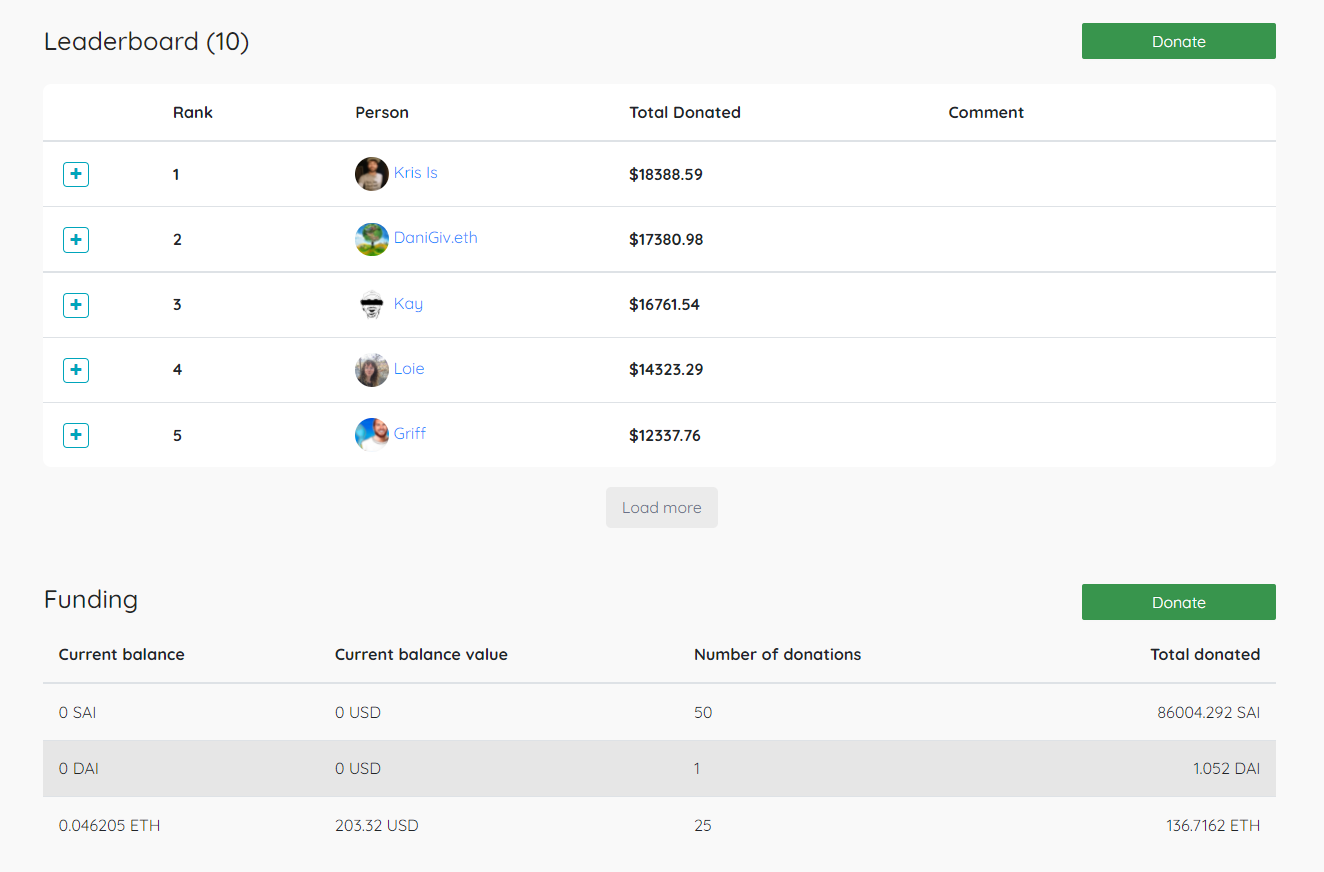
On-chain (Rinkeby) tracking of the original Giveth DAO — The Unicorn DAC at trace.giveth.io
Our “GIVernance” has matured significantly in preparation of launching the GIVeconomy. We’ve learned a lot along the way and are excited to share where the Giveth Reputation DAO (rGIV DAO) is now.
How does Giveth DAO it?
Within Giveth, we strive to demonstrate these principles:
- To value transparent, holistic governance and work to be a shining example of it.
- To explore and readily adopt new innovations that support us in embodying these values.
- To practice the self-organizing power of sociocracy, which we apply in the organization of tasks, participation in the Proposal and Advice Process, and facilitation of our governance meetings.
Our GIVernance Circle Mission Statement reflects this foundational intention:
We are progressively decentralizing the Giveth decision-making process by building a community and a token-based economy around our platform that recognizes contributions, values participation and rewards altruism.
The Giveth DAO is made up of people who have acquired reputation and trust through perseverance and dedication to the Future of Giving by participating in building the Giveth community and our Donation Applications (DApps).
nrGIV — The Reputation Token for Stewarding the GIV launch
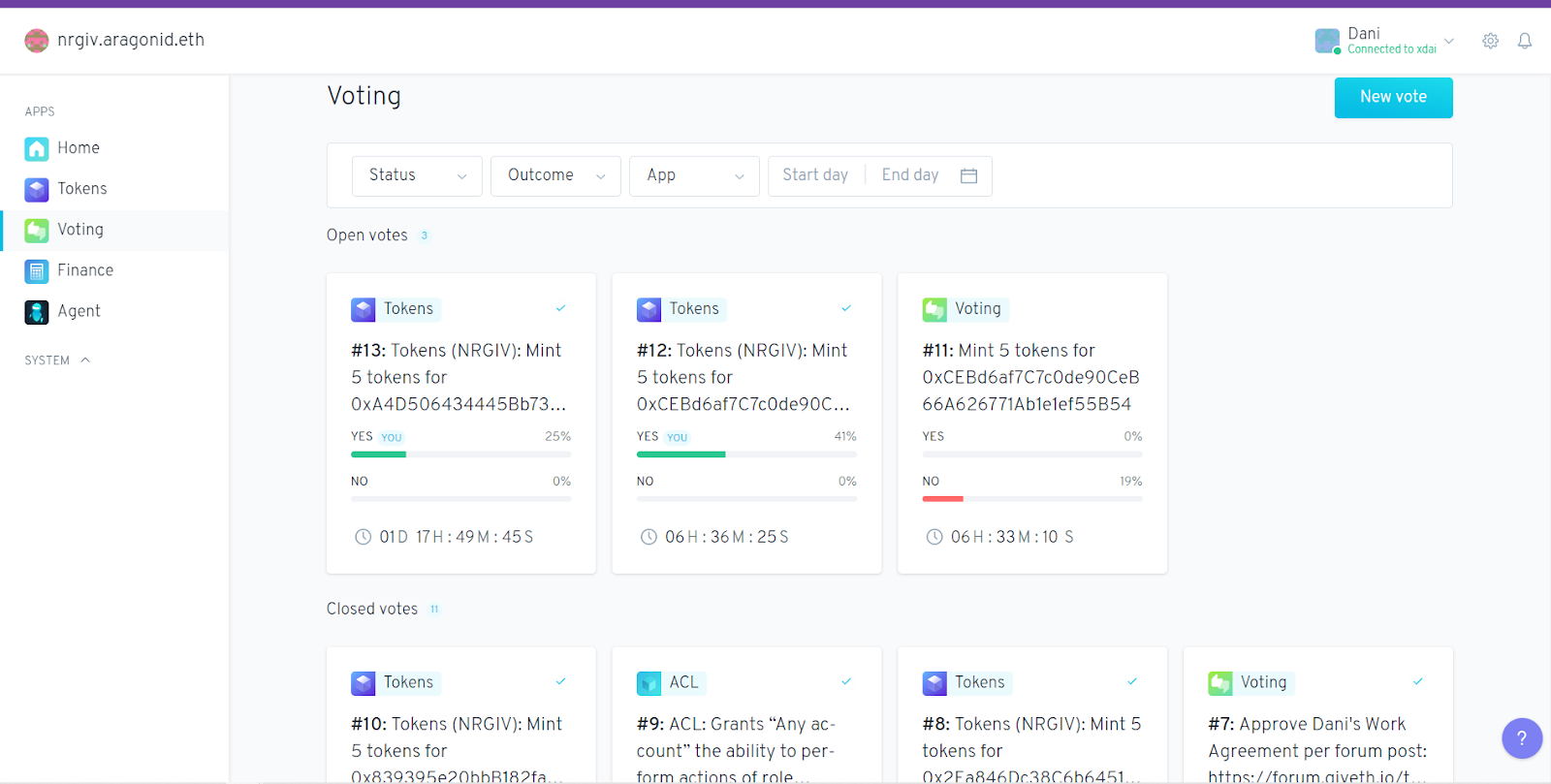
Minting the new reputation tokens (nrGIV) to replace the old (rGIV) on Aragon.
While most activities take place off-chain in our publicly accessible forums and live-streamed meetings, the community has implemented and recently renovated an on-chain solution. Deployed via 1Hive as an Aragon Reputation DAO using the xDai chain, it is designed to evolve along with the advancements of our own protocols as well as those of Ethereum collaborators and eventually, multi-chain ecosystems.
It has 3 primary stewardship responsibilities:
- Stewarding the existing Giveth commons (Giveth Multisigs, Giveth.io, Trace.giveth.io, and soon to launch GIVeconomy DApps)
- Stewarding the GIV token initial distribution.
- Stewarding the Progressive Decentralization of the GIVeconomy.
Why participate?
Reputation is earned over time, but rewards are dished early and often to recognize value and encourage participation in the Giveth Community.
We !praise you for:
- Attending meetings and speaking up in Discord
- Testing and using our tools
- Feedback into development for improvement
- Maintenance of our living processes
- Writing and reviewing documentation
- Talking about us on social media (criticism welcome, just be kind about it!)
Monthly tabulation of Praise and SourceCred results in the disbursement of ETH, DAI, and/or PAN tokens, depending on what’s been donated to Giveth. We give what we’ve got, and the more you give, the more you get!
Over time, new contributors can build reputation in the community and become eligible for nrGIV tokens that are minted on a quarterly basis. In this way we co-create a community of builders that are self-organized by design, decentralized by technology, and altruistic by nature.
Who Qualifies? It Starts with Showing Up!
Anyone can earn rewards by engaging in the Giveth community
Praise is our way of saying thanks for being awesome. The first 20 minutes of our weekly Community Call are dedicated to celebrating who did what for the past week. By using the PraiseBot, !praise can be given in any channel on the Giveth Discord server at any time, and we even have a dedicated #praise channel because there are so many people doing great things.
All those thank you’s are captured in a spreadsheet and reviewed by the Working Group Stewards every four weeks, to use in combination with SourceCred for allocating a percentage of the available Rewards to contributors. This practice of !praising contributors transparently and distributing rewards was kicked off 4 years ago with the first PraiseBot built for Giveth on Matrix and now carried forward by Commons Stack and the Token Engineering Commons!
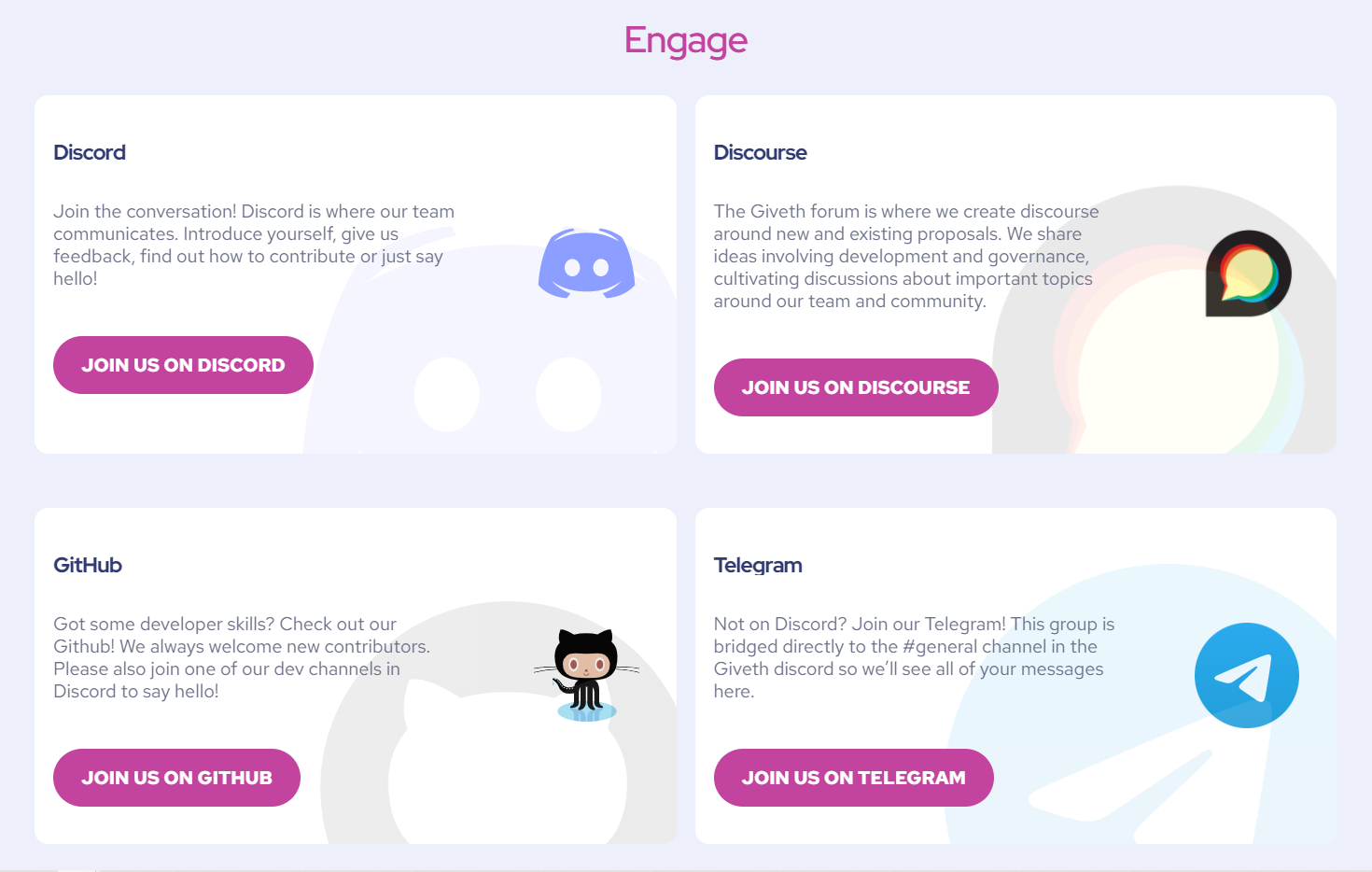
Givething Cred for contributions through Discord, Discourse, & GitHub
As a global digital community, we recognize that while much of what we do is seen by others — a lot is also just happening organically online and can be quantified to some extent by using data analytics.
When you engage in our community discussions on Discord, participate in the soft governance via our Discourse forums, and create or work on issues in the GitHub repositories, these interactions are recorded and gathered into a SourceCred dashboard.
Consistency builds Reputation, and earns Trust
Contributors qualify for nrGIV (Giveth Reputation Tokens) after 3 months of participation as recorded via the Praise and SourceCred calculations reviewed monthly. These tokens are minted quarterly for new and active contributors. Those no longer contributing do not receive more nrGIV — but do retain all of the tokens previously received.
When did Giveth move to On-chain Governance?
The original rGIV DAO instance can be seen here, where we launched with 1,111 tokens distributed to each of the 8 Giveth Reputation DAO co-founders in January 2021 for the previous year.
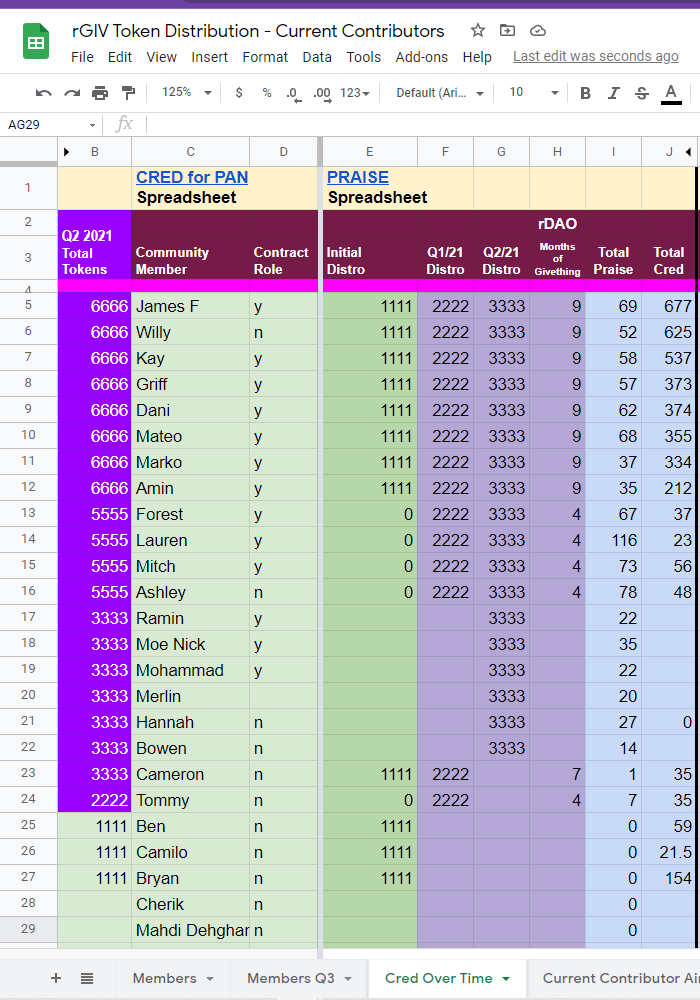
2,222 tokens were minted for each qualifying contributor in April for January-March 2021, then 3,333 in July for April-June. As in any good experiment, discoveries arose from these iterations and in October 2021, the rGIV DAO voted to retire the rGIV token in favor of creating a new instance (nrGIV) with several configuration changes, including the move from 1,111 to 1, ditching the extra digits.
Also changed in this new rGIV DAO: the distribution of tokens now follows a Fibonacci sequence. This means that the number of tokens minted for each contributor in the latest period is equal to the sum of the two previous two periods.
As shown, Dani has been contributing since day 1. She earned 1 token to vote with the first period (1,111 — which was converted to 1 in the new simplified DAO), 2 tokens for the second period, 3 tokens the third period (because 1 + 2 = 3), and 5 tokens the fourth period (because 2 + 3 = 5). If she stops contributing there, she will retain her total balance of 1 + 2 + 3 + 5 = 11 nrGiv tokens for voting on governance proposals after the 4th period. If she continues consistently contributing to the Giveth Community, she will always have at least 1 token more than any contributors that came in later.
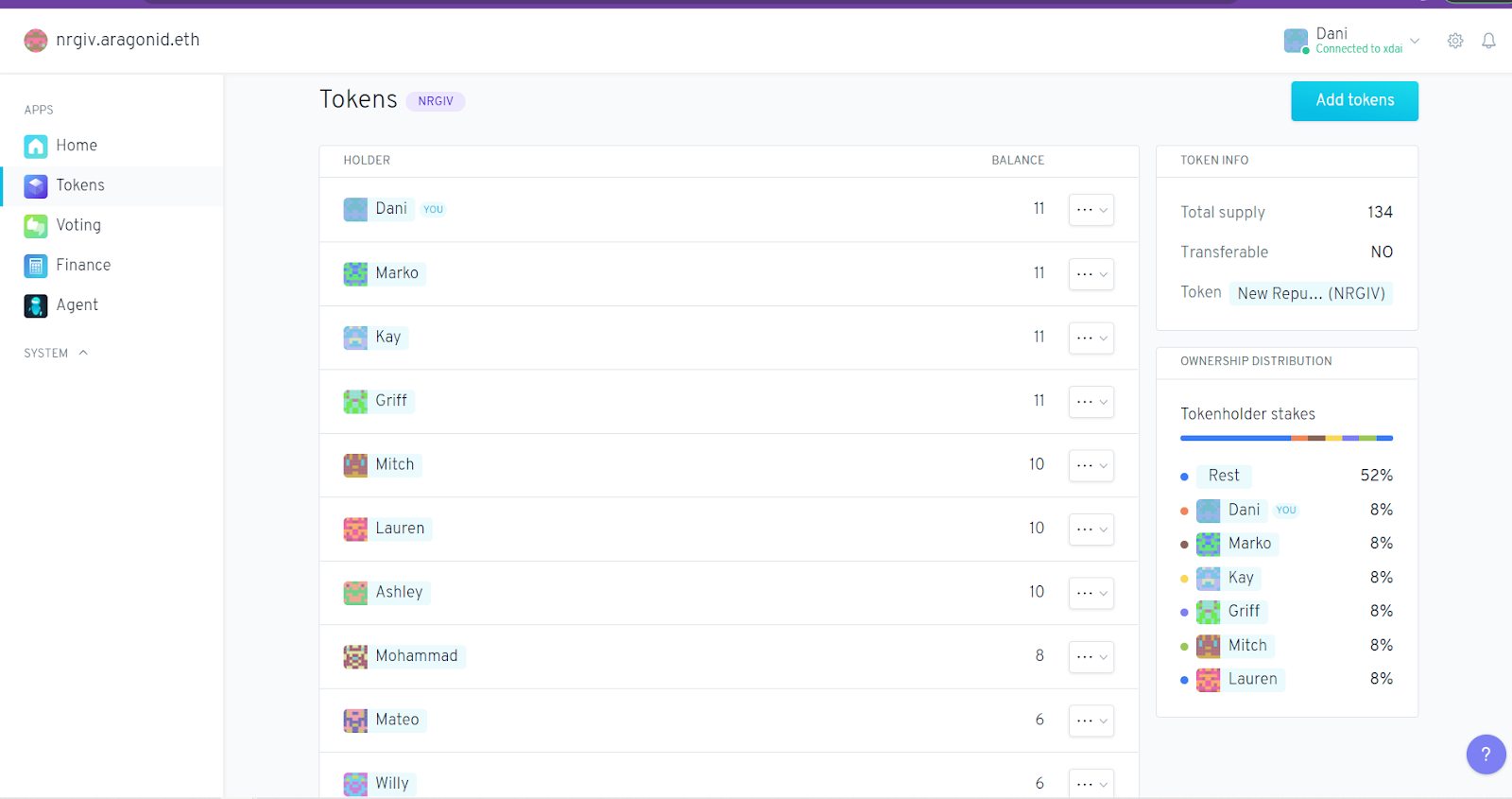
James is a co-founder of the rGIV DAO, and received tokens for periods 1, 2, and 3. He resigned during the 3rd period to focus on toucan.earth, and did not contribute during the 4th period, so does not qualify for the minting of 5 tokens. His voting weight remains at 6 tokens, while current contributors weight grows to 11. In this case where a past contributor does not return for 6 months and misses 2 full periods, their voting weight is now lower than a new contributor receiving nrGIV tokens during those two mintings.
So in this example, new contributors in periods 4 and 5 receive 8 tokens (3 + 5) bringing their total to 12 (5 + 8) — double that of James. When James returns, he will come in with his previous token weight and after another 3 months of contributions, qualifies to again receive nrGIV tokens.
In this way new contributors can gain as much influence as someone who has contributed in the prior two time periods, and over time the influence of past contributors is reduced after exiting the community. Behind this design is an assumption that those currently contributing can make the most informed vote about current governance of the organization. For consistent contributors who have been around from the beginning, those joining later will never reach or surpass your voting power, incentivizing retention of talent and wisdom for the community while incrementally fractionalizing the lead.
Successful decentralized governance has been shown to require a healthy balance of new contributors being valued early, and long-time contributors valued for carrying the vital threads of vision, mission and information on the organization from past experience.
Note: If you are on maternity or paternity leave, you still get the period’s token allocations during leave.
What is the nrGIV token used for?
Voting on proposals that build the #FutureofGiving
Anyone can make a proposal to the rGIV DAO, whether they are an nrGIV token holder or not. But first! Giveth follows a Sociocratic proposal-forming process by soliciting opinions and clarifying questions initially, then making revisions and polling for support via an Advice Process on our forum.
Previously hosted on Loomio, you can see the proposal process used to initiate the rGIV DAO here!
In 2021 Giveth revised its organizational structure into new Circles and Working Groups while launching a new proposal management method on Discourse:
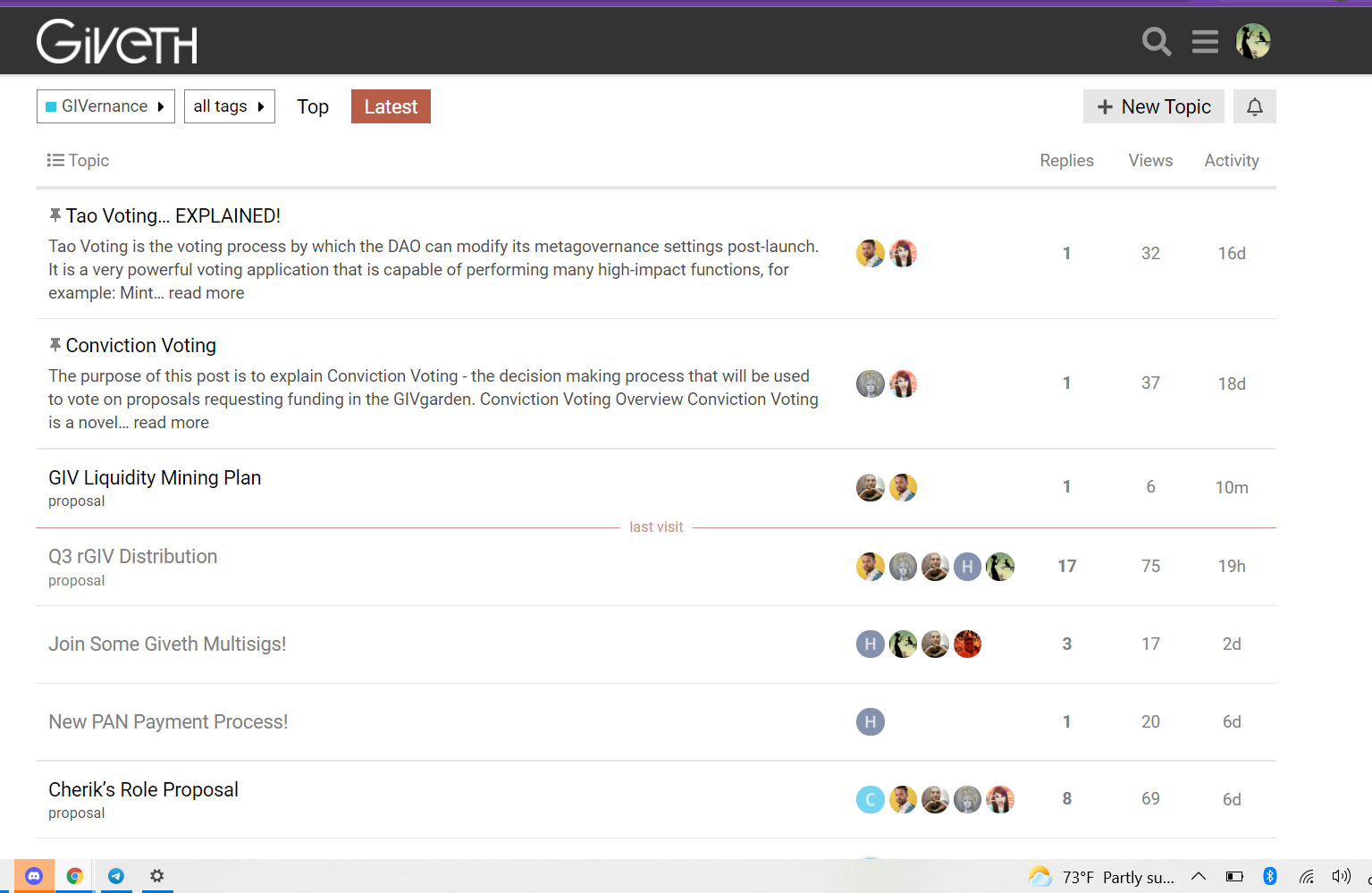
From Off-chain Advice to On-chain Voting
After a proposal has been reviewed, the champion (person writing and advocating for the proposal) can post a new Vote to the rGIV DAO! Once made, nrGIV token holders have 5 days to use their tokens and vote “yes” or “no”. Voting on each proposal in this DAO allocates your fully accrued nrGIV token quantity; and you do not lose them if you vote. In other words, if you have 7 tokens, and you vote “yes,” then 7 nrGIV tokens are added to the total “yes” votes while the tokens remain in your wallet. When you vote on other proposals, you still have 7 nrGIV tokens to vote on those as well.
The Giveth Reputation DAO does not use Conviction Voting or require you to “stake” your reputation tokens — you never lose your tokens or have to choose which proposal to use them on; you always have the same number of tokens to vote with for each new proposal.
In order for a proposal to pass, it must have a majority of yes votes, and reach a “minimum approval” level, which we’ve set at 25%. If a proposal doesn’t have more than 25% of all minted tokens voting yes on it, it automatically does not pass regardless of the distribution of “yes” and “no” votes given. However, the proposal can always be proposed again and voted on again.
The second metric within each vote is the “Support” level. We have set that at 88%. If a vote reaches this level, it has more than the majority by a large margin and is labeled as having strong support. The third metric set by the DAO is “vote duration”; how much time must pass before voting is closed.
Which Decisions Does the Giveth Reputation DAO Need to Vote on?
The rGIV DAO has the responsibility for governing the GIVeconomy launch and our commons. This means that the assets built by the Giveth community and the funding received from donors to support Giveth are owned by the Community itself — the Givers and Makers contributing their skills, time, energy and resources to it. So deciding how to build the DApps, contract with individuals to fill roles on the team, and distribute funds to the Circles for maintaining operations and development of the open source code is a job for nrGIV token holders that collectively make up the rGIV DAO.
The road to decentralized governance has been paved with the bricks of this goodwill, and you can see again in Loomio how the Giveth Unicorn DAC used the Advice Process and voting to decide how to allocate a 285 ETH gift in 2019!
The Giveth Reputation DAO has the opportunity to do this again now as we contemplate allocation of the proceeds from Rainbow Rolls and the Optimism Retroactive Public Goods Grant. Balancing the upcoming needs of the Community to sustain itself through launching the GIVeconomy this year, and to reward the contributors who worked tirelessly in past years to earn the respect and the funding, is the responsibility of the current DAO members.
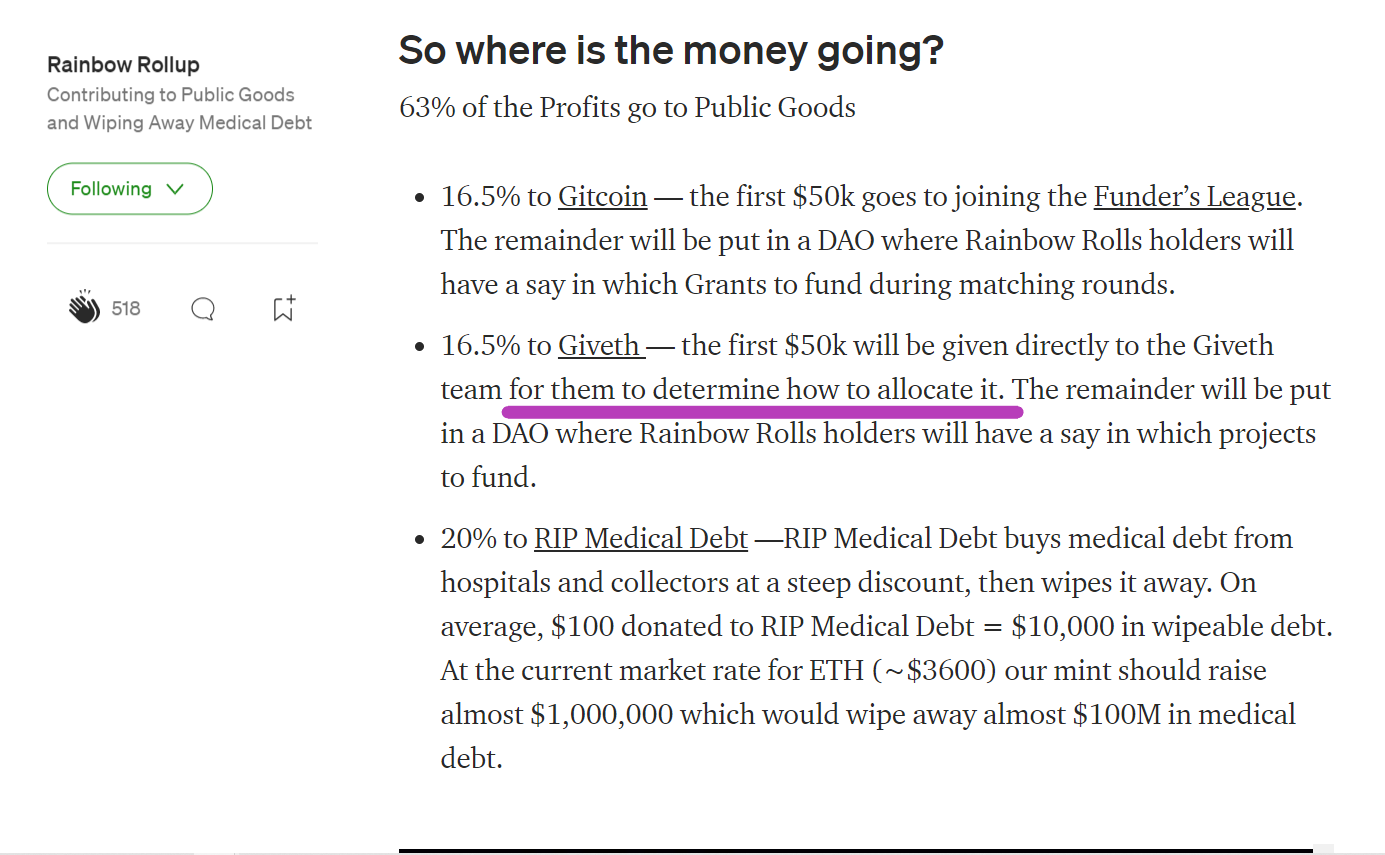
If this is a subject that interests you enough to have read this whole post, perhaps you are interested in contributing to the Giveth commons by participating in our off-chain Advice Process on the current decision regarding how to allocate the funds from Rainbow Rolls!
We are a donor-focused organization and in order to build what meets the needs of our donors AND project owners, we welcome and encourage your donations AND your suggestions.

Giveth DAOs Donations
Giveth is run entirely on donations, which can be given through a variety of routes including the DAC on TRACE, the Project at Giveth.io, Gitcoin Grants, and direct contributions to the MultiSig wallet address. Some of these are given by charitable entities with specific intention and others are unconditional gifts — through trace.giveth.io you can select the exact purpose of your gift yourself.
Stay tuned to our Discourse Forum and Discord Chats as we launch the GIVeconomy, and feel welcome to chime in as we structure the longer-term transition of governing the Giveth commons from the rGIV token holders to the GIV token holders using the GIVgarden by 1Hive!
Become part of the #FutureofGiving on Giveth.io by donating to any project with a Verified badge, and you can begin your journey as a Giver by qualifying to receive GIV tokens… the Future of the Giveth DAO.
Want to get more involved?
- Join us on Discord or Telegram
- Discover our Docs
- Fork our code on GitHub
- Follow us on Medium, Twitter, Reddit and YouTube
Help us Build the Future of Giving: 🦄 Donate directly 🦄 or buy a Ledger with our affiliate link
